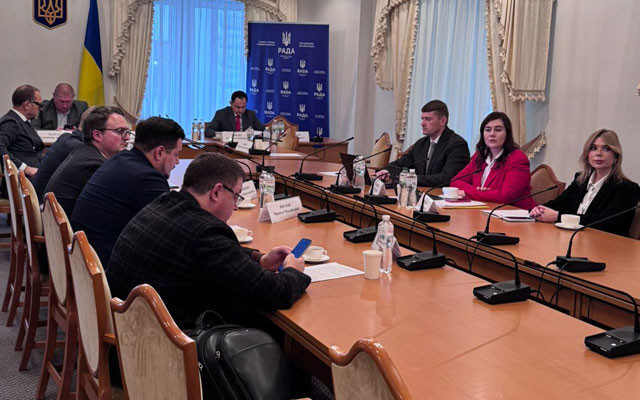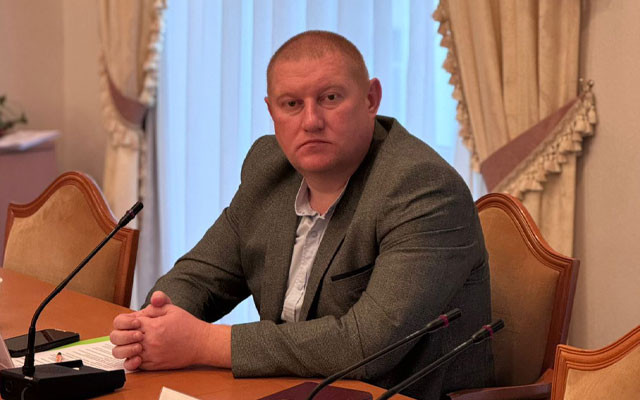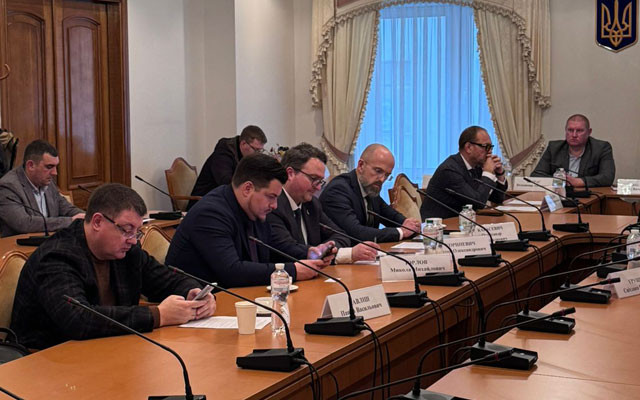
The Verkhovna Rada took another step towards ratifying the Convention for the Protection of the Profession of Lawyer



On November 5, the Verkhovna Rada held a working meeting dedicated to the translation of the Council of Europe Convention for the Protection of the Profession of Lawyer for its subsequent signing and ratification. The issue was initiated by the Ministry of Foreign Affairs, which drew attention to the key term «lawyer» in the international treaty.
Fundamentally «for»
The meeting was held at the Verkhovna Rada Committee on legal policy. The chairman of the subcommittee on the organization and activities of advocacy and legal aid bodies Volodymyr Vatras recalled that the Convention (in English - Council of Europe Convention for the Protection of the Profession of Lawyer, - ed. Ed.), adopted by the Committee of Ministers of the Council of Europe on March 12, 2025, is the first international legal instrument that comprehensively guarantees the independence, security, and professional autonomy of advocates. «It was developed specifically to protect persons engaged in the practice of law and professional associations to which such persons belong», - he noted.
The MP also pointed out that Article 3 of the Convention defines a «lawyer» as a natural person who, in accordance with national law, is qualified and authorized to practice law. «The interpretation of this definition in the explanatory report specifies that each state party itself determines the national professional titles covered by the concept and makes a corresponding declaration during ratification. Thus, this concept is not a universal designation for any legal professional, but specifically for a person who is qualified and licensed to practice the profession», - the subcommittee chairman emphasized. In the national legal system of Ukraine, such a subject is only a person with the status of an advocate within the meaning of the Law «On the advocacy and legal practice». Therefore, in his opinion, «the only correct and legally accurate equivalent of the term «lawyer» in the text of the Convention is «advokat» (advocate)».
The parliament is set on ratifying the Convention, assured the attendees the chairman of the subcommittee on political reform and constitutional law Maksym Dyrdin. «This is in the interests of Ukraine, in the interests of the international obligations that Ukraine has undertaken. Plus, it is also in the interests of our citizens, because effective legal protection of our citizens depends on a strong advocacy», - he said.
The MP noted that the text of the international treaty was submitted to the Ministry of Foreign Affairs at the end of August, and the parliamentary Committee is awaiting information from the MFA and the Ministry of Justice on the status of the official translation, as well as further procedural steps – from signing to submitting the document to the Verkhovna Rada for consideration.
Functional approach
The history of the Convention's creation was recalled in her speech by the President of the Ukrainian National Bar Association, the Bar Council of Ukraine Lidiya Izovitova. She emphasized that Ukraine was directly involved in the preparation of the draft Convention, as the Vice President of the UNBA, BCU Valentin Gvozdiy worked as part of the relevant Committee of experts at the Council of Europe.
L. Izovitova noted that the Convention and its explanatory report are based on the idea of protecting the advocate profession as a regulated activity carried out by persons with official status defined by national law, membership in a professional association, and the obligation to comply with ethical standards and advocate privilege.
On this basis, the UNBA formulated and submitted to the Verkhovna Rada Committee on Legal Policy, the Ministry of Foreign Affairs, and the Ministry of Justice a legal position in which it insists that in the text of the Convention, the term «lawyer» for the purposes of this international agreement should be translated exclusively as «advocate» and not as «jurist» or «legal professional», since the latter are broader terms for persons working in the legal field but who do not have the status, powers, and guarantees characteristic of advocacy.
Developing these arguments, V. Gvozdiy explained that in different European countries, the legal profession has its own official names, but is united by a conceptual understanding of the term, enshrined, in particular, in Directive 98/5/EC of the Council of the European Union. «This directive clearly states that the term «lawyer» means any person in an EU member state (and we must adapt to EU legislation, and this directive will become part of our legislation) who is authorized under the internal legislation of the member state to perform and practice a profession with a specific title», - he noted.
«For example, «lawyer» in Italy is translated as «avvocato», in Ireland as «barrister» or «solicitor», - explained one of the authors of the document. «That is, we are not talking about a translation, but about a conceptual understanding of the term». According to V. Gvozdiy, it was precisely this functional approach that the authors of the Convention relied on when describing in Articles 5-9 the guarantees specific to persons with the status of an advocate: the right to confidential communication with a client, advocate-client privilege, participation in professional associations, disciplinary responsibility, prohibition of identifying an advocate with a client, etc.
V. Gvozdiy emphasized that the Convention also applies to professional associations of advocates that are granted legal personality. This further confirms the document's focus on the regulated profession of advocacy. Therefore, in his opinion, in the case of Ukraine, the only correct translation of the term «lawyer» is «advocate», and each other signatory state will indicate the official national name of the legal profession in its declaration.
Aspects of representation
Serhiy Vlasenko, a member of the Verkhovna Rada Committee on legal policy, pointed out that although Ukraine has introduced a constitutional model of representation in courts exclusively by advocates, there are exceptions in legislation and practice. In particular, in civil cases, lawyers without advocate status may participate in the consideration of certain categories of cases, and in proceedings before the European Court of Human Rights, representation is not limited to advocates. In such cases, lawyers who do not have advocate status actually possess the same amount of information and also need guarantees of protection. Therefore, according to S. Vlasenko, when interpreting and translating the term «lawyer», it is advisable to take into account a wider range of persons who represent clients in the relevant courts and tribunals in order to prevent a situation where some practitioners remain outside the scope of guarantees.
In response, V. Gvozdiy recalled that Article 131-2 of the Constitution of Ukraine establishes representation of persons in courts as a general power of advocates, and exceptions, including self-representation, are already clearly regulated by law. As for international proceedings, Article 3 of the Convention itself provides that its protection also extends to any person recognized by an international court, tribunal, or body established by an international organization competent to act in proceedings when providing advice or representation in such proceedings. Thus, the issue of guarantees for representatives in the ECHR is regulated in the text of the Convention without the need to expand the translation of the term «lawyer».
Departmental aspect
State Secretary of the Ministry Oleksandr Karasevych informed the meeting participants about the progress of work on the translation of the Convention and the consultations conducted by the Ministry of Foreign Affairs. According to him, Ukraine must simultaneously complete internal procedures for signing the Convention and prepare for its ratification, as the translation can be finalized after signing. At the same time, the issue of translation accuracy is fundamental, given the well-known problems with the texts of some international treaties concluded during the Soviet era.
Therefore, the Ministry of Foreign Affairs has approached the Secretariat of the Council of Europe and the states that have already signed the Convention with a request for their approach to defining the range of professions that fall under the concept of «lawyer». According to preliminary information, where advocacy is a clearly regulated profession, states use the national equivalent of the term «advocate». However, there are other approaches. «We have the case of the Republic of Poland, where the embassy informed us that this Convention will cover two professions, both «adwokat» and «radca prawny» (we understand that this is analogous to our legal advisor)», - the State Secretary said.
He promised to forward the final summary results of these consultations to the Ministry of Justice for the development of a balanced joint approach.
The position of the Ministry of Justice was announced by Deputy Minister Lyudmila Sugak. She noted that during the technical translation of the Convention, the ministry proceeded from the assumption that the term «lawyer» should still be translated as «advocate». According to her, the same position is held by the National School of Judges of Ukraine, the National Anti-Corruption Bureau of Ukraine, the Office of the Prosecutor General, and the Security Service of Ukraine.
The National School of Judges, in particular, considers it appropriate to retain the term «advocate» as the basic term and not to use broader concepts such as «yurist» or «pravnyk», as they have no definition in Ukrainian legislation. The representative of the Ministry of Justice also recalled Ukraine's obligation to implement EU directives aimed at protecting the advocate profession and the preparation of a draft government decision on the creation of an interdepartmental working group that will deal with the ratification of the Convention and the preparation of relevant amendments to Ukrainian legislation.
***
During the discussion, a key distinction was made: Article 3 of the Convention explicitly defines a «lawyer» as a natural person who is qualified and authorized to practice the profession of lawyer in accordance with national law. The original wording of the definition is as follows: «lawyer» shall mean any natural person who is qualified and authorized, according to national law, to practice the profession of lawyer. And Article 20 allows each state to independently specify in its declaration which professions fall under this definition.
For Ukraine, this profession is advocacy, since only advocates have officially confirmed status and authorization to practice. Extending the interpretation of the term to other lawyers who do not undergo the procedure for admission to the profession would contradict the text of the Convention itself and would deprive it of its meaning as an instrument for the protection of a regulated profession.
© 2026 Unba.org.ua Всі права захищені
"Національна Асоціація Адвокатів України". Передрук та інше використання матеріалів, що розміщені на даному веб-сайті дозволяється за умови посилання на джерело. Інтернет-видання та засоби масової інформації можуть використовувати матеріали сайту, розміщувати відео з офіційного веб-сайту Національної Асоціації Адвокатів України на власних веб-сторінках, за умови гіперпосилання на офіційний веб-сайт Національної Асоціації Адвокатів України. Заборонено передрук та використання матеріалів, у яких міститься посилання на інші інтернет-видання та засоби масової інформації. Матеріали позначені міткою "Реклама", публікуються на правах реклами.